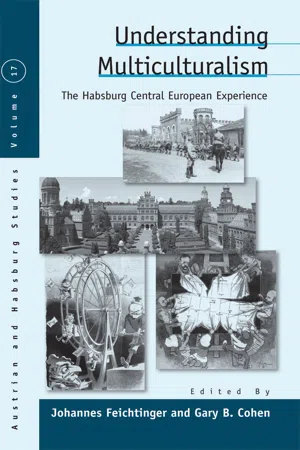
Understanding Multiculturalism
The Habsburg Central European Experience
- 256 pages
- English
- PDF
- Available on iOS & Android
Understanding Multiculturalism
The Habsburg Central European Experience
About this book
Multiculturalism has long been linked to calls for tolerance of cultural diversity, but today many observers are subjecting the concept to close scrutiny. After the political upheavals of 1968, the commitment to multiculturalism was perceived as a liberal manifesto, but in the post-9/11 era, it is under attack for its relativizing, particularist, and essentializing implications. The essays in this collection offer a nuanced analysis of the multifaceted cultural experience of Central Europe under the late Habsburg monarchy and beyond. The authors examine how culturally coded social spaces can be described and understood historically without adopting categories formerly employed to justify the definition and separation of groups into nations, ethnicities, or homogeneous cultures. As we consider the issues of multiculturalism today, this volume offers new approaches to understanding multiculturalism in Central Europe freed of the effects of politically exploited concepts of social spaces.
Frequently asked questions
- Essential is ideal for learners and professionals who enjoy exploring a wide range of subjects. Access the Essential Library with 800,000+ trusted titles and best-sellers across business, personal growth, and the humanities. Includes unlimited reading time and Standard Read Aloud voice.
- Complete: Perfect for advanced learners and researchers needing full, unrestricted access. Unlock 1.4M+ books across hundreds of subjects, including academic and specialized titles. The Complete Plan also includes advanced features like Premium Read Aloud and Research Assistant.
Please note we cannot support devices running on iOS 13 and Android 7 or earlier. Learn more about using the app.
Information
Table of contents
- Understanding Multiculturalism
- Table of Contents
- List of Tables and Figures
- Preface
- Introduction
- Section I. Identity Formation in Multicultural Societies
- 1. Heterogeneities and Homogeneities
- 2. Mestizaje and Hybrid Culture
- 3. Do Multiple Languages Mean a Multicultural Society?
- Section II. The Dynamics of Multicultural Societies, Politics, and the State
- 4. Multiculturalism, Polish Style
- 5. Multiculturalism against the State
- 6. Migration in Austria
- Section III. Identities Expressed, Negotiated, and Challenged in Multicultural Settings
- 7. The Slice of Desire
- 8. On "Neighbors" and "Strangers"
- 9. Culture as a Space of Communication
- Selected Bibliography
- Notes on Contributors
- Index